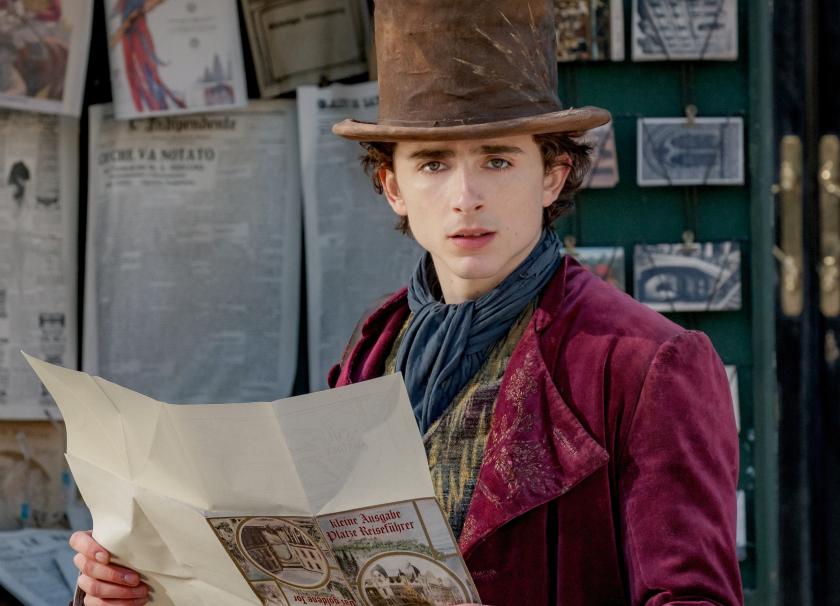As the 117 minutes of Wonka tick by, the question it poses gains momentum: who is this film actually for? Children of all ages?
It’s an “origins” story, standard now for all manner of film character, showing the sunnier side of Roald Dahl’s eccentric chocolatier, and how his magical chocolate factory came into being. This Wonka (Timothée Chalamet) is more elfin than goblin, a lovable chap with looks to set teenage girls swooning. It has a love story of a kind in it, but not the type that sets young teeth a-grinding. It’s essentially a comedy, with Britain’s sitcom finest popping up like wack-a-mole contestants for a few seconds each, before disappearing into the mixed bag of bonbons the film is offering.
A bonus in this lucky dip is a teeny-weeny Hugh Grant as a grumpy Oompa-Lompa known to his chums as Shortypants who is wont to break into a dance not a million miles from his Love, Actually turn. His signature orange face and white eyebrows now eerily evoke a recent US president, though that’s it for anything resembling political allegory that the attending grown-ups might like.
As a blend it’s not funny enough, or even sweet enough, oddly, though on paper, it probably looked like a slam dunk, the recipe of the Paddington films given another whisk. It has the same writers, Simon Farnaby and Paul King, the latter also directing, as he did Paddington 2. It has even purloined the yin and yang of Paddington 2 for its cast, Sally Hawkins as Wonka's saintly late mother, as well as Grant.
 There are other borrowings — a touch of The Grand Budapest Hotel for the interiors of imposing civic buildings that look like a mad blend of Florence and Hugo’s Paris, with more of a Victor Hugo/Sweeney Todd feel for the decrepit guest-house-come-laundry where Mrs Scrubitt (Olivia Colman, pictured left, in all-out ‘ows-yer-farver cockney mode) imprisons Wonka. The gadgetry has that same Heath Robinson-meets-steampunk look Wes Anderson is fond of as well.
There are other borrowings — a touch of The Grand Budapest Hotel for the interiors of imposing civic buildings that look like a mad blend of Florence and Hugo’s Paris, with more of a Victor Hugo/Sweeney Todd feel for the decrepit guest-house-come-laundry where Mrs Scrubitt (Olivia Colman, pictured left, in all-out ‘ows-yer-farver cockney mode) imprisons Wonka. The gadgetry has that same Heath Robinson-meets-steampunk look Wes Anderson is fond of as well.
What the script doesn’t have is a heart-stealer like Michael Bond’s accident-prone Peruvian bear and his squad of friends — the Brown family, and even Knuckles McGinty — who enhance his appeal by openly loving him. Wonka has his fellow enslaved launderer Noodle (Calah Lane) as a fan, a literate, street-smart orphan girl with a mysterious signet ring, but that’s about it. The more he piles on his magic tricks, the less we understand why he can’t use them to escape the clutches of Mrs Scrubitt and the wiles of villainous Mr Slugworth (a feline Paterson Joseph) and his two chocolatier cronies (Matt Lucas and Mathew Baynton). People seem to love him for his confectionery, not for his big-hearted nature.
 Timothée Chalamet has a sweet, pure voice, an agile body for the dance numbers and an unforced charm. He ably fleshes out the familiar trope of innocence pitted against a cruelly chocoholic world. But the screenplay ladles on every flavour in its larder, not content with simple narrative lines. There isn’t one villainous chocolatier, there are three — two of them sadly superfluous. I’d keep Paterson Joseph (pictured right), who has fun delivering his lines with a vicious smile and a camp-coy moue that can wring malice out of a word like “marshmallow”. But he and Colman are all that’s needed.
Timothée Chalamet has a sweet, pure voice, an agile body for the dance numbers and an unforced charm. He ably fleshes out the familiar trope of innocence pitted against a cruelly chocoholic world. But the screenplay ladles on every flavour in its larder, not content with simple narrative lines. There isn’t one villainous chocolatier, there are three — two of them sadly superfluous. I’d keep Paterson Joseph (pictured right), who has fun delivering his lines with a vicious smile and a camp-coy moue that can wring malice out of a word like “marshmallow”. But he and Colman are all that’s needed.
Wonka could also jettison two of his three accomplices at Mrs Scrubitt's, where only Abacus Crunch (Jim Carter), a former accountant, is needed to move the plot forward. A giraffe called Abigail gets at least three times more screen time than any of these three, who also suffer from being oddly unfunny. Even Noodle’s parentage becomes a side-hustle for the script.
By the end, you are sated — from too many tricks with chocolates, too many times when Wonka’s success is snatched away by the trio of dastardly chocolatiers, too many characters with no major purpose. The script starts losing its shape and its credibility. It keeps making Wonka voluntarily return to his imprisonment after perfecting a clever escape routine, so that … what? He can fulfil the “contract” he signed, binding him to Mrs Scrubitt? Is that really something the average child in the audience can understand, or the average adult care about? Despite his ability to conjure a whole batterie de cuisine from his top hat, Wonka doesn’t seem to be able to magic up a pile of bank notes to pay off his vicious jailer.
The musical numbers, by Joby Talbot, who has written two fine scores for the Royal Ballet, are pleasing enough, with amusingly daft lyrics that team up “chocolate” with “sockelet” and “pockelet”. But when Willy breaks into the 1971 film’s Leslie Bricusse/Anthony Newley number “A World of Pure Imagination” for the finale, the gap between that first unashamedly child-centred Willy Wonka film, scripted by the author himself, and this confused confection is glaringly obvious.















Add comment